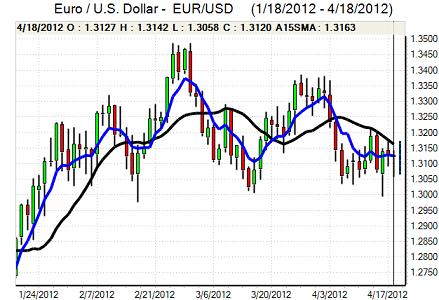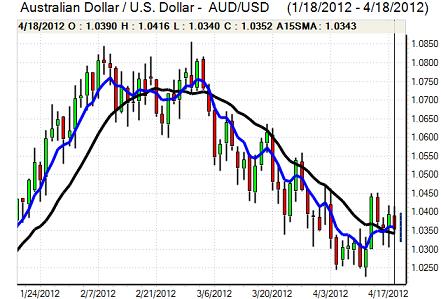EUR/USD
The Euro was unable to make any impression on resistance levels above 1.3120 against the dollar in early Europe on Wednesday and remained generally on the defensive ahead of the US open.
There were further concerns surrounding the Spanish outlook which had an important negative impact on the Euro. There were further concerns surrounding the banking sector as non-performing loans rose to an 18-year high, reinforcing fears over a negative spiral of falling house prices and further bad debts. In this environment, there were further declines for the stock market.
There were tensions ahead of Thursday’s bond auction with fears that weak investor demand would trigger another round of selling. The Italian government stated that the growth and fiscal outlook was weaker than expected which further undermined sentiment. Tensions were illustrated by a decline in German yields to 0.14% at the latest 2-year bond auction.
There were no major US data releases during the day and markets were generally cautious ahead of next week’s Federal Reserve interest rate decision.
The dollar again found it difficult to gain any sustained traction which helped protect the Euro and there were further reports of capital repatriation. In this environment, the Euro was able to regain the 1.31 level during the US session before running into selling pressure with little change in Asia on Thursday.

Source: VantagePoint Intermarket Analysis Software
Call now and you will be provided with FREE recent forecasts
that are up to 86% accurate* 800-732-5407
If you would rather have the recent forecasts sent to you, please go here
Yen
The dollar found initial support in the 81.20 area against the yen during Wednesday and pushed to highs just above the 81.50 level as the yen remained on the defensive on the crosses. Comments from Bank of Japan member Nishimura reinforced expectations that there could be a further relaxation of monetary policy at next week’s monetary policy meeting which would further undermine support for the yen, especially if the Federal Reserve held policy steady.
The yen found support at weaker levels as Euro-zone concerns stemmed selling pressure on the currency while a wider loss of support nudged the dollar back to the 81.25 area.
The latest trade data recorded an annual increase in exports which helped lessen the impact of a record trade deficit for the year. Bank of Japan Governor Shirakawa reiterated that the bank was committed to powerful monetary easing which reinforced speculation that there could be further policy measures and the dollar moved back to the 81.50 region.
Sterling
Sterling found support just below the 1.59 level ahead of the key UK events on Wednesday and rallied strongly during the European session.
The latest UK unemployment data was stronger than expected with an increase in the claimant count of 3,600 in the latest month from a revised 4,500 previously while the unemployment rate dipped to 8.3% from 8.4%, which was the first decline since the third quarter of 2011.
Principal attention was focussed on the Bank of England minutes with the MPC voting 9-0 for unchanged interest rates. The quantitative easing vote was more surprising with a 8-1 vote for keeping the total bond purchases on hold at GBP325bn. In particular, markets reacted strongly to Posen’s decision to vote for the majority and drop the call for further action as he has been consistently the most dovish committee member.
The bank was more concerned over the inflation outlook and the risk of stubbornly high price pressures. The central bank was still concerned over the risks of recession, but the net outcome was a drop in expectations surrounding further quantitative easing. The shift in expectations pushed Sterling to a peak above 1.6025 against the US currency and it also pushed to fresh 19-month highs beyond 0.82 against the Euro.
Swiss franc
The dollar pushed to a high just above the 0.92 level against the franc before weakening back to the 0.9150 area. There was some US cushioning from a slightly weaker franc tone against the Euro, although the Euro was unable to sustain the advantage.
The latest ZEW business confidence index recorded an increase to 2.1 for April from 0.0 previously. The National Bank was the main focus of attention with Jordan appointed as permanent chairman. He reinforced his commitment to the current policy and the determination to defend the 1.20 minimum Euro level. There was some renewed speculation that the bank could raise the minimum level, although there was no move to adjust it at this announcement.

Source: VantagePoint Intermarket Analysis Software
Call now and you will be provided with FREE recent forecasts
that are up to 86% accurate* 800-732-5407
If you would rather have the recent forecasts sent to you, please go here
Australian dollar
The Australian dollar was unable to regain the 1.04 level against the US currency during Wednesday and dipped to lows just below 1.0350 as there was fresh caution surrounding risk appetite.
There were also persistent doubts surrounding the Chinese economic outlook, especially with a reported decline in house prices. The currency gained brief support from anther round of expectations surrounding a cut in Chinese reserve ratio requirements, but there was no immediate move and the Australian currency was unable to move above the 1.04 level. There was little change in the latest NAB quarterly business confidence survey.



